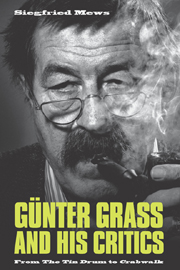Book contents
- Frontmatter
- Contents
- List of Abbreviations
- Introduction
- Part 1 Danzig, Center of the Universe
- 1 Die Blechtrommel / The Tin Drum
- 2 Katz und Maus / Cat and Mouse
- 3 Hundejahre / Dog Years
- 4 Danziger Trilogie / The Danzig Trilogy
- Part 2 From Danzig to the Global Stage: Grass's Fiction of the 1970s and 1980s
- Part 3 After Reunification: Old Problems and New Beginnings
- Epilogue
- Works Cited
- Index
4 - Danziger Trilogie / The Danzig Trilogy
from Part 1 - Danzig, Center of the Universe
Published online by Cambridge University Press: 05 February 2013
- Frontmatter
- Contents
- List of Abbreviations
- Introduction
- Part 1 Danzig, Center of the Universe
- 1 Die Blechtrommel / The Tin Drum
- 2 Katz und Maus / Cat and Mouse
- 3 Hundejahre / Dog Years
- 4 Danziger Trilogie / The Danzig Trilogy
- Part 2 From Danzig to the Global Stage: Grass's Fiction of the 1970s and 1980s
- Part 3 After Reunification: Old Problems and New Beginnings
- Epilogue
- Works Cited
- Index
Summary
A GENUINE TRILOGY?
ALTHOUGH COMPARISONS BETWEEN Grass's first three major narratives had been made before, John Reddick (1975), taking a cue from the author, who supposedly complained about the lack of critics' recognition of the interrelation of the three works (see Reddick 1971), was the first to state explicitly that Die Blechtrommel, Katz und Maus, and Hundejahre belong “together as a kind of trilogy” (xi), show a “genetic relationship” (xii), and “amount to a distinctive complex” (xiii). He based this claim on the virtually simultaneous origin of concepts, drafts, and plans that then evolved into the three related yet separate texts, which he named the Danzig Trilogy. The title caught on and is now widely used; Luchterhand, then Grass's publisher, brought out a special edition of the three texts as Danziger Trilogie (1980), and in 1987 Harcourt Brace Jovanovich followed suit with the first American edition of the entire trilogy. As Volker Neuhaus and Daniela Hermes in their miscellaneous collection on the Danziger Trilogie (1991, 7) point out, the trilogy evolved into a pentology through the addition of the later works Der Butt (see ch. 7) and Die Rättin (see ch. 10); Grass's current publisher Steidl advertises Das Danzig-Sextett (2006), which in addition to the volumes of the trilogy includes Der Butt, Unkenrufe (see ch. 12), and Im Krebsgang (see ch. 15). The significance of Danzig for Grass's oeuvre is thus incontestable; to point out its importance has indeed become a commonplace in Grass criticism.
- Type
- Chapter
- Information
- Günter Grass and his CriticsFrom 'The Tin Drum' to 'Crabwalk', pp. 92 - 100Publisher: Boydell & BrewerPrint publication year: 2008



